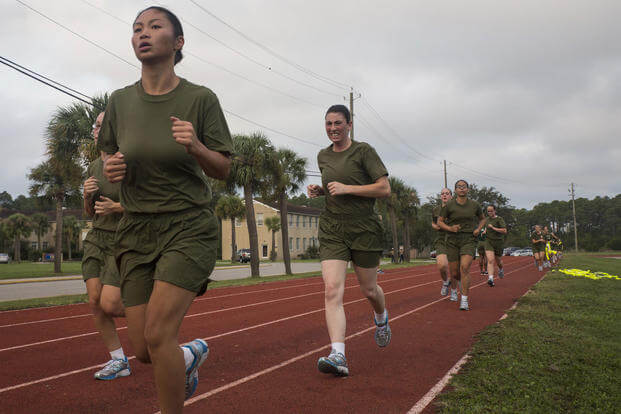As the military services moved to admit women into previously closed special operations and ground combat jobs in 2016, Army officials were tasked with looking for ways to get the best performance out of female troops in order to minimize injury and boost their opportunities to succeed.
And they discovered one unlikely culprit that was holding some women back: chronic iron deficiency.
While it's well known that women tend to be more iron-deficient than men for various reasons, the scope of the problem, and its impact on overall performance, was eyebrow-raising.
About a quarter of the women who enter the Army training pipeline have an iron deficiency, said Scott McConnell, who discussed Army Training and Doctrine Command's efforts to improve training at the quarterly meeting of the Defense Advisory Committee on Women in the Services on Wednesday. After several weeks of training, that figure can double, he said.
"That impacts your body's ability to carry oxygen to the vital organs. And so iron deficiency can actually be reflected in poor aerobic fitness levels and physical performance," McConnell said.
In February 2016, the Army announced it would begin providing iron-rich multivitamins to female soldiers. And, McConnell said, the move has made a difference.
"The statistic we have is that the iron supplements can actually shave two minutes off the two-mile run time," he said.
As services address the challenge of preparing female troops to meet stringent physical standards designed for men, they're gaining new insights about the way nutrition affects performance -- insights that have the potential to benefit the total force.
Since the services began opening previously closed jobs last year in response to a mandate from then-Defense Secretary Ash Carter, it has become clear that it's completely possible for women to meet minimum infantry requirements.
To date, 14 female Army officers, 16 noncommissioned officers, and 21 junior enlisted soldiers have been assigned to infantry positions in the active component and Reserve, according to Army data presented Wednesday.
On the Marine Corps side, nine officers and 63 enlisted women have graduated military occupational specialty school for previously closed fields, including one in the rifleman MOS.
At the same time, it's evident that women face greater physical hurdles just because they're built differently than men and have different average capability ranges.
And that's where tools such as nutrition, supplements and smart training can help.
While the Corps has not announced a specific new supplement regimen, the service is working to overhaul its entire approach to fitness and health with the new Force Fitness Division activated this year. Part of what the division will do, officials have said, is review meal options in chow halls with an eye to making offerings healthier and more conducive to peak performance.
Brian McGuire, the Corps' deputy force fitness branch head, told DACOWITS members Wednesday that the service is also looking to offer "post-exercise nutritional supplementation" to boost Marines' performance and recovery. Officials are also setting up some young officers at The Basic School with wearable devices that measure biometrics and performance and may serve as a warning measure against heat sickness and other injuries.
And while standards to enter various ground combat jobs are the same whether you're male or female, the Marine Corps is making some changes to the way it trains in order to avoid injury while maximizing performance.
"We have reduced running mileage," McGuire said. "Because lather, rinse, repeat shows us that shorter, harder, faster has equal or greater benefit than longer, slower, less intense."
On the Army side, McConnell said other aids, such as the calcium-rich performance nutrition bar introduced as a bedtime supplement for recruits earlier this year, are also proving useful.
"We have found that when soldiers have food in their stomach, they are actually less susceptible to heat injuries," he said. "That's actually one of the other aspects of this nutrition bar, and who would have thought, in the 21st century, that we're kicking over that rock and understanding something that we did not understand."
-- Hope Hodge Seck can be reached at hope.seck@military.com. Follow her on Twitter at @HopeSeck.





























